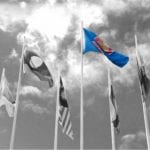Indonesian Foreign Policy under Three Years of Jokowi’s Administration
Siti Widyastuti Noor
October 2017, marked the third year of administration for Indonesian President Joko “Jokowi’ Widodo. In the beginning of his administration, Jokowi announced the nine prioritized agendas as Nawa Cita, a program that was initiated as an effort to bring Indonesia into a politically sovereign state, economically independent and cultural personality as a state.
In order to realize the spirit of Nawa Cita, the Indonesian Ministry of Foreign Affairs formulates three priorities of foreign policy, namely: safeguarding Indonesian sovereignty, enhancing the protection of Indonesian citizens and intensifying economic diplomacy.
Meanwhile, Dino Patti Djalal, former Deputy Minister of Foreign Affairs of the Republic of Indonesia, notes that at the beginning of Jokowi’s administration, more attention is paid to the domestic affairs, whose policies tend to be inward-looking, as reflected in his focus on developing national infrastructure. There are 225 projects on a national infrastructure based on President Regulation no. 3 years 2016. The project was later improved to as 248 projects based on the President Regulation no. 58 of 2017. This national infrastructure project is one of the highlighted projects at its disposal in order to improve inter-regional ties and as an effort to reduce the gap between eastern and western parts of Indonesia.
A Retreat from Multilateralism
Observing the dynamics of foreign policy for 3 years administration, Jokowi is more likely to emphasize on consolidation at the national level compared with foreign policy of his predecessor, Susilo Bambang Yudhoyono (SBY) which emphasized more on a free and active engagement on multilateralism with an outward-looking policy, “a thousand friends, zero enemy”.
Jokowi is more of a domestic reformer when compared to SBY is actively promoting foreign policy as the spotlight of his government. The most noticeable manifestation of differences is Indonesia’s retreat from multilateralism, which is demonstrated by Indonesia’s inactivity to participate in multilateral forums, particularly ASEAN. He missed three opportunities to present as head of state at the United Nations General Assembly and also in the Developing Eight High-Level Meeting in Istanbul.
Although the domestic development agenda progressed significantly, it should be understood that the success of the foreign policy is also capable of affecting the domestic agenda and the Indonesian people. Jokowi’s foreign policy outlook is considered to be a loss to Indonesia’s position as a leading country in ASEAN that might also have an impact on the regional integration agenda.
In addition, many consider that Indonesia’s withdrawal from Multilateral Forum eliminates the opportunity of Indonesia to participate actively in promoting important issues of concern to Indonesia to other countries, as well as undermining Indonesia’s position as a non-permanent member of UNSC candidate.
Jokowi’s Economic Diplomacy
As one of the focus of his policy, Jokowi plays a significant role to enhance the economic diplomacy. Priorities on the economy are defined in the Strategic Plan of Ministry of Foreign Policy 2015-2019 as the utilization of international politics to achieve the national development target.
One of the policies is the diversification of export market. For most of the time, Indonesia is focusing its export activities on traditional export destination countries, such as United States, China, or European market. Under Jokowi, significant changes can be found from a widening and diverse export destination countries, as Indonesia starts to established economic relations with the Middle East, Latin America, and African countries, such as Chile, Turkey, Egypt, Niger and some other countries. This move resulted in a more positive impact on Indonesia’s export and the surplus of trade balance. According to the data from Central Statistics Agency (BPS), Indonesia’s export in the January-September 2017 period reached $123.36 billion.
Indonesia and ASEAN
As a founding member and de facto leader of ASEAN for the great importance of ASEAN GDP and the largest population, Indonesia’s centrality in ASEAN is valuable. Although Indonesia’s participation in ASEAN is not as big and as large as ever, Indonesia still shows great concern and active participation in the Rohingya refugee story. Recently, the latest issue of human rights issues in Rakhine State, Myanmar, Indonesia, through the Minister of Foreign Affairs visited Myanmar for a bilateral meeting to discuss the issue in Rohingya. This method became effective because it later became one of the ways to attract the Government of Myanmar and humanitarian aid humanitarian aid in the form of daily necessities, set up six elementary school buildings, and one hospital.
In recent news, Jokowi is reportedly sending aid to Rohingya refugees through the ASEAN instruments. The Foreign Ministry’s efforts to approach the Myanmar government and encourage ASEAN Member Countries to provide humanitarian assistance through the ASEAN Humanitarian Assistance Coordinating Center for Disaster Management (AHA Center) is a sign that Indonesia under Jokowi’s government still values geopolitics and relations among ASEAN countries.
Despite of the hard work of the government to introduce the new approaches and development priorities, it is important for Indonesia to continue paying attention to the regional and international cooperation that has been built since the previous presidency, as a form of active participation and fulfillment of Indonesia’s role in international level.





